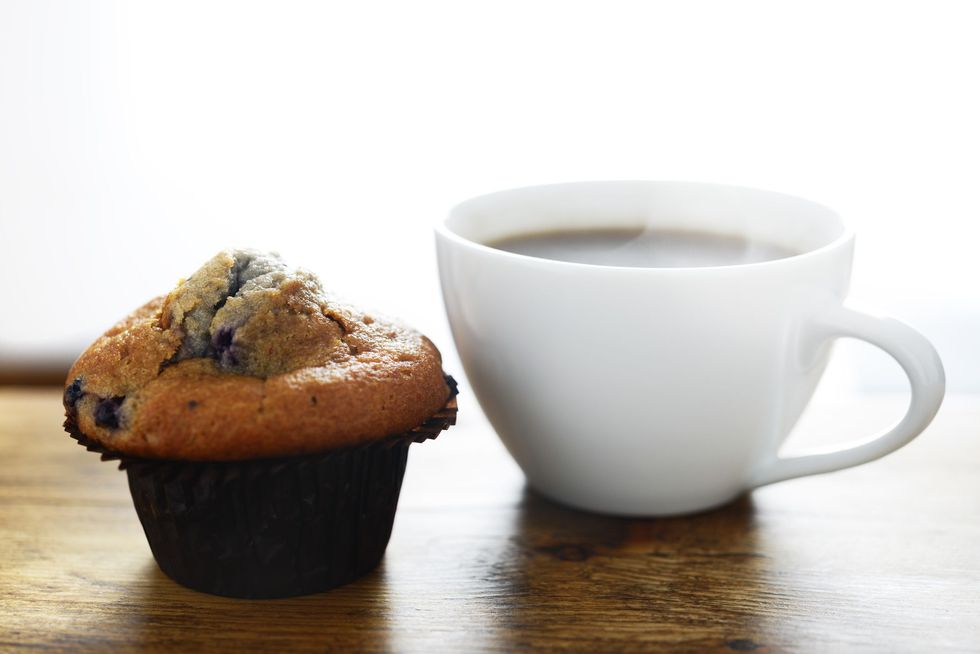Blueberry muffins are often lauded as a healthy on-the-go snack, because they contain fruit and can keep you going until lunchtime. But sadly, the baked goods aren't always as nutritious as they might appear.
New research highlights the large variation in the sugar content between different products and a lack of clear labelling, with experts saying this makes it difficult for people to know how much sugar they are consuming.
The study, which analysed 28 muffins sold in both food outlets in train stations and supermarkets, found that 61% of them contained six teaspoons of sugar or more. (NHS guidelines recommend a limit of seven teaspoons a day for adults and six teaspoons a day for children aged seven to 10).
On average, muffins bought from train station food outlets were the worst offenders. They contained 19% more sugar, the equivalent of 1.2 more teaspoons, than the average supermarket muffin and were also 32% bigger in size.
The variation in sugar content across a range of muffins was also significant. Of the 14 railway outlets included, Costa had the highest sugar content per muffin (40.3g per 122g muffin or 10 teaspoons of sugar), although this has now been reduced to 28.6g. The lowest was Pumpkin (18.3g on average per 92g muffin or five teaspoons of sugar).
At the supermarkets, Tesco Blueberry Muffins 4 Pack had the highest sugar content (29.0g per 82g muffin or 7 teaspoons of sugar) while Marks and Spencer's blueberry muffins had the least (13.7 per 65g muffin or 3 teaspoons of sugar).
Organisations Obesity Health Alliance and Action On Sugar are now calling for manufacturers to reduce the sugar content in their products in line with the government's proposal to cut it by 20% by 2020. They are also recommending that all retailers publish nutrition information, including traffic light labelling, to help consumers to make informed decisions.
"We may think grabbing a blueberry muffin is a reasonably healthy option for a snack on the go compared to other cakes or a chocolate bar - yet the figures suggest otherwise," Caroline Cerny, from the Obesity Health Alliance, said.
"There is huge variation in both the size of muffins and the sugar content, and with limited nutrition labelling, it's all too easy to eat a huge amount of sugar in just one serving."
While we're "hardwired to love sweet things", Good Housekeeping nutritionist Anita Bean advises sticking to foods that contain natural sources of sugar.
"Over the past couple of decades foods have been getting sweeter – drinks, snacks and processed foods are often packed with sugar – so it's a good idea to retrain your taste buds and get used to the more natural levels of sweetness in fresh fruit," she commented. "And don't be fooled by the so-called healthy sugars like honey, agave syrup, maple syrup and coconut sugar. As far as your body's concerned they're all just sugar and they will be dealt with in exactly the same way.
Cutting back on sweet treats? See the blueberry muffins with the highest sugar content recorded by the report below:
- McDonalds: (32g per muffin) - Equivalent of eight teaspoons of sugar
- Pret A Manger: (30.5g) - Eight teaspoons
- Caffe Nero: (29.1g) - Seven teaspoons
- Tesco: (29g)- Seven teaspoons
- Costa: (28.6g) - Seven teaspoons
- Starbucks: (26.3g) - Seven teaspoons
And the least sugary:
- M&S: (13g per muffin) - Equivalent of three teaspoons of sugar
- Co Op: (17g) - Four teaspoons
- Holly Lane (Aldi): (18g) - Five teaspoons
- Asda: (18g) - Five teaspoons
- Pumpkin: (18.3g) - Five teaspoons
- Delice de France: (18.7g) - Five teaspoons
From: Good Housekeeping UK














